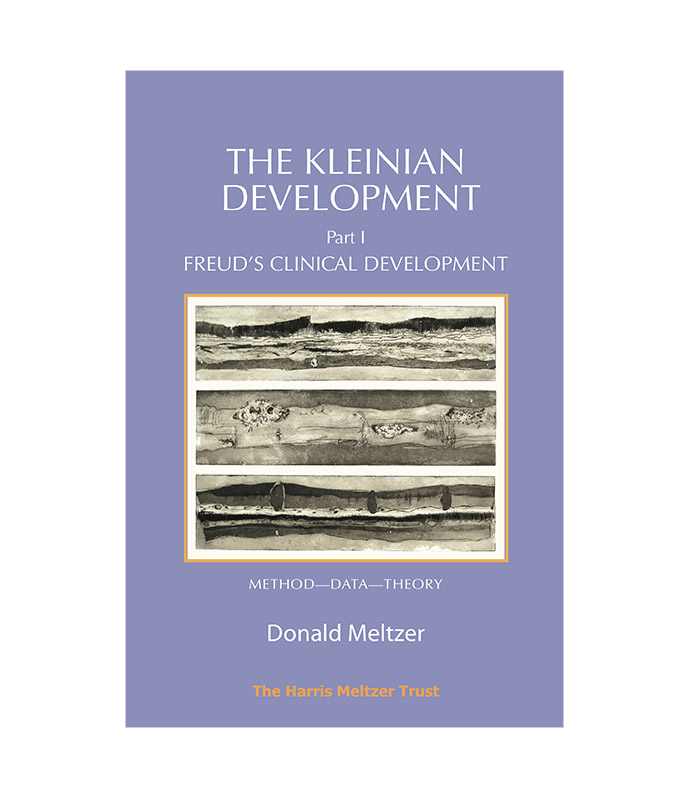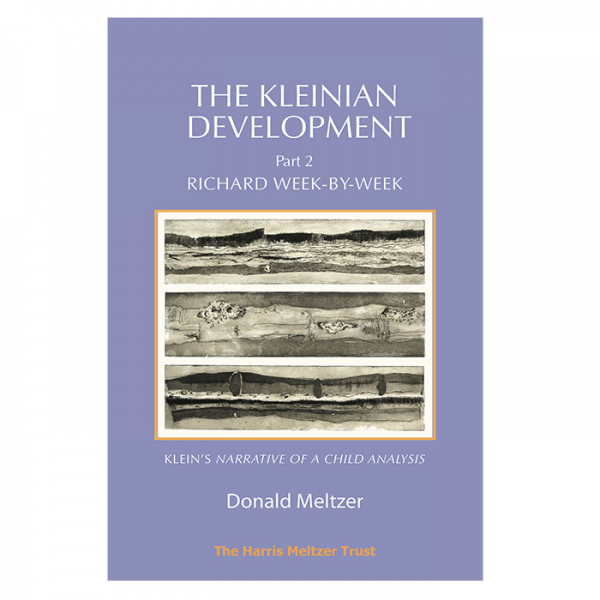Meltzer describes the series of lectures on Freud, Klein and Bion known as The Kleinian Development as both a quest for personal integration into some kind of ‘combined internal psychoanalytic object’, under whose aegis he personally could aspire to work, and as a vademecum for students. They were originally delivered to students at the Institute and at the Tavistock, specifically with the aim of demonstrating the logical development of that line of psychoanalytic practice. Seeking for this logical development reveals ‘an unfolding of method, leading to discovery of new realms of phenomena, generating in turn new models of the mind, which then modify method, etc.’
The lectures on Freud therefore are concerned less with his theory of mind and more with the spiralling alternation of thinking and clinical discovery. Meltzer focuses on those papers, mainly clinical, which highlight key moments of change in Freud’s own knowledge and understanding, brought about by the impact of what Bion was to call ‘learning from experience’ with its inbuilt autobiographical implication. These include: the ‘Fragment’ on Dora in which Freud’s curiosity (about the new method) enabled him to press on where Breuer had retired after his experience with with Anna O. (the ‘inventor of psychoanalysis’); the work with Little Hans which established the significance of childhood but only retrospectively; the new evidence of internal conflict manifest by the Rat Man; the Leonardo paper, not for its initiation of the ‘bad tradition’ of psychobiography but for its autobiographical examination of the ideas of sublimation and narcissism; the Schreber memoir in which Freud began to conceptualise the reality of the inner world; the ‘child being beaten’ which demanded a new understanding of masochism; and the Wolf Man with its central phantasy of the primal scene, and the idea of true bisexuality (rather than active-passive trends) and the ‘complete Oedipus complex’.
In Meltzer’s view all these investigations undermined Freud’s existing theoretical preconceptions or speculations; of ‘three Freuds’ that he identifies (the obsessive theoretician, the politician guarding the ‘party line’, and the artist-clinician) it was the latter that moved inexorably towards working with the ‘structural model’ that corresponded to the whole-personalities that confronted him in real life, and to the realities of ‘identification with an object in pain’; ‘Freud was going to have to discard this energetics theory and the idea of un-pleasure, and really come to grips with a more purely psychological theory, in which ‘pain’ really was what it meant’. Meltzer believes that although Freud did not, in his theory of mind, ever fully confirm the shift away from the libido model (it shows more in his descriptive language that in his theorisation), yet the move from energetics to meaning and its organization marks the ‘direction in which psychoanalysis has been directing its attention and development ever since’. And Freud, despite the pessimism of his last years, nonetheless exemplified the fact that ‘there is no complete analysis: that any analysis is, at its best, a preparation for a continuation of self-scrutiny and development, and it is not meant to protect people from having conflicts in life, but only to equip them to meet these. Analysis is the beginning, and not the end, of a process.’ And so it is with the analytic movement.





Debbie Hindle, Organising tutor, Scottish Institute of Human Relations –
‘Meltzer’s beautifully written text traces a line of development in psychoanalysis from Freud through Abraham to Klein and Bion, focusing on their methods of observation, clinical work and emerging theories. By highlighting points of congruence and difference and significant shifts in understanding, he outlines a continuity of clinical method and thought that has come to be known as the “Kleinian Development”. This text is an invaluable companion to the readings of Freud, Klein and Bion for all students of psychoanalysis, for clinicians and for all those interested in the development of psychoanalytic thinking.’
Grete Tangen Andersen, Morten Andersen, Jon Morgan Stokkeland, Lilian Stokkeland, Eirik Tjessem (The Meltzer Study Group, Stavanger, Norway) –
‘With Meltzer as guide we can discover a wealth of object-relational themes in Freud, themes that seems more evident today than in the early years of psychoanalysis. In Part 1 of “The Kleinian Development” we follow the tension between Freud’s truthfully written clinical observations and a theory not always capable of apprehending these findings, and see how this tension became a challenge to the next generation of analysts, among them Klein.’